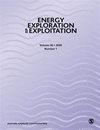Sustainable energy recovery from municipal solid wastes: An in-depth analysis of waste-to-energy technologies and their environmental implications in India
IF 1.6
4区 工程技术
Q4 ENERGY & FUELS
引用次数: 0
Abstract
In recent years, in response to an increased demand for renewable energy sources, there has been a rise in the rate of energy recovery from municipal solid trash. This study analyses the feasibility of employing a variety of energy recovery methods to produce clean power from municipal solid waste (MSW). The conversion of MSW into a variety of useable sources of energy, such as fuel, heat and electricity, is required for the process of energy recovery. Other strategies for the recuperation of lost energy include gasification, incineration, anaerobic digestion, and the recovery of landfill gas. This article provides a high-level assessment of the advantages and disadvantages associated with each technology that is currently being utilised in India. According to the findings of the study, recovering energy from municipal solid waste is a sustainable and cost-effective option that can fulfil the growing demand for power while simultaneously lowering emissions of greenhouse gases and the amount of rubbish that ends up in landfills.从城市固体废物中回收可持续能源:深入分析印度的废物变能源技术及其对环境的影响
近年来,随着对可再生能源需求的增加,从城市固体垃圾中回收能源的比例也在上升。本研究分析了采用多种能源回收方法从城市固体垃圾(MSW)中生产清洁能源的可行性。在能源回收过程中,需要将城市固体垃圾转化为各种可利用的能源,如燃料、热能和电能。其他回收损失能源的策略包括气化、焚烧、厌氧消化和垃圾填埋气回收。本文对印度目前采用的每种技术的优缺点进行了高层次评估。研究结果表明,从城市固体废物中回收能源是一种可持续的、具有成本效益的选择,既能满足日益增长的电力需求,又能减少温室气体排放和垃圾填埋量。
本文章由计算机程序翻译,如有差异,请以英文原文为准。
求助全文
约1分钟内获得全文
求助全文
来源期刊

Energy Exploration & Exploitation
工程技术-能源与燃料
CiteScore
5.40
自引率
3.70%
发文量
78
审稿时长
3.9 months
期刊介绍:
Energy Exploration & Exploitation is a peer-reviewed, open access journal that provides up-to-date, informative reviews and original articles on important issues in the exploration, exploitation, use and economics of the world’s energy resources.
 求助内容:
求助内容: 应助结果提醒方式:
应助结果提醒方式:


